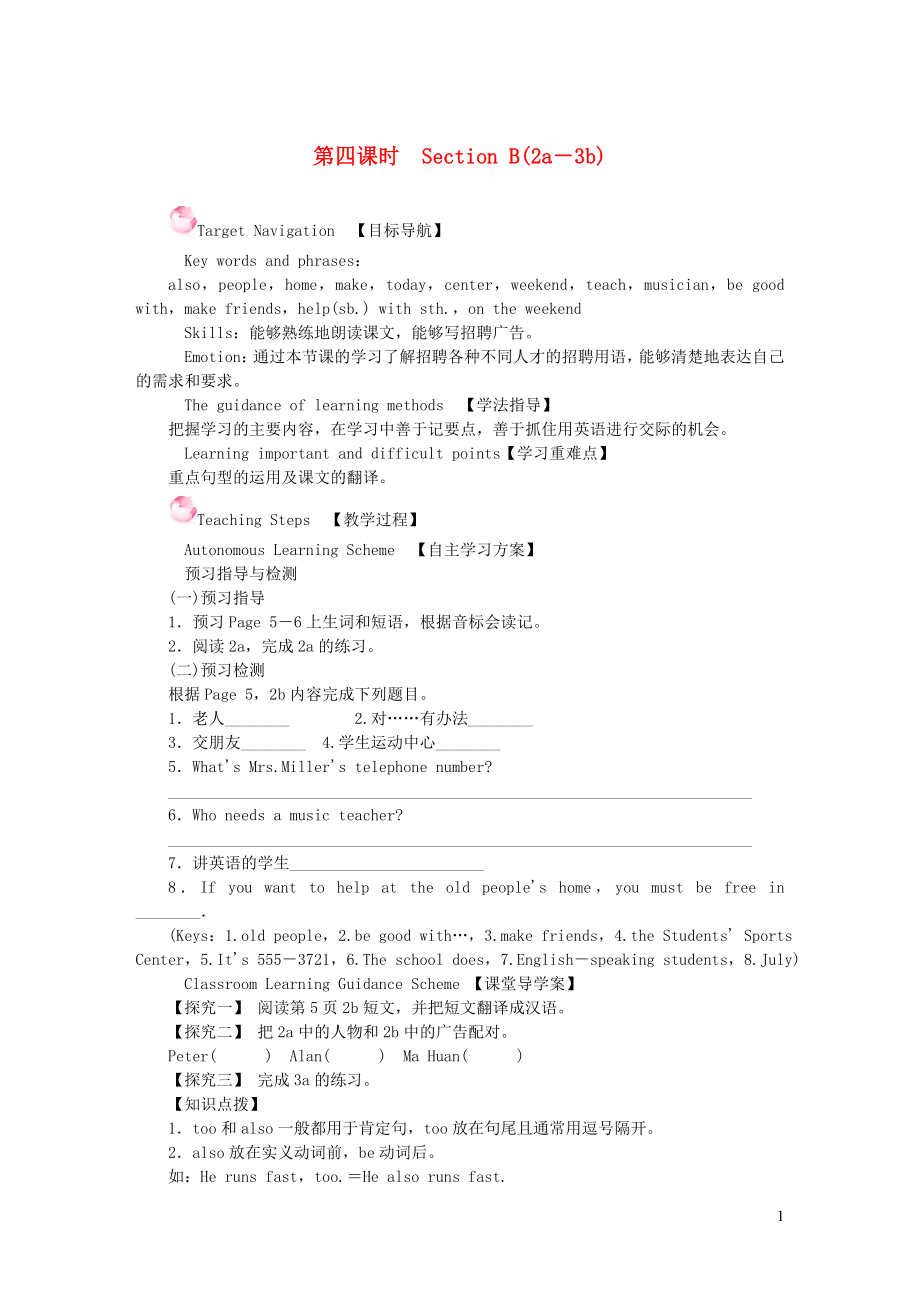《七年級(jí)英語(yǔ)下冊(cè) Unit 1 Can you play the guitar第四課時(shí) Section B(2a-3b)教案(新版)人教新目標(biāo)版》由會(huì)員分享��,可在線閱讀���,更多相關(guān)《七年級(jí)英語(yǔ)下冊(cè) Unit 1 Can you play the guitar第四課時(shí) Section B(2a-3b)教案(新版)人教新目標(biāo)版(4頁(yè)珍藏版)》請(qǐng)?jiān)谘b配圖網(wǎng)上搜索���。
1、
第四課時(shí) Section B(2a-3b)
4
Target Navigation 【目標(biāo)導(dǎo)航】
Key words and phrases:
also����,people,home����,make,today���,center�,weekend���,teach,musician��,be good with,make friends�,help(sb.) with sth.,on the weekend
Skills:能夠熟練地朗讀課文����,能夠?qū)懻衅笍V告。
Emotion:通過(guò)本節(jié)課的學(xué)習(xí)了解招聘各種不同人才的招聘用語(yǔ)�,能夠清楚地表達(dá)自己的需求和要求。
The guidance of lea
2����、rning methods 【學(xué)法指導(dǎo)】
把握學(xué)習(xí)的主要內(nèi)容,在學(xué)習(xí)中善于記要點(diǎn)���,善于抓住用英語(yǔ)進(jìn)行交際的機(jī)會(huì)�。
Learning important and difficult points【學(xué)習(xí)重難點(diǎn)】
重點(diǎn)句型的運(yùn)用及課文的翻譯����。
Teaching Steps 【教學(xué)過(guò)程】
Autonomous Learning Scheme 【自主學(xué)習(xí)方案】
預(yù)習(xí)指導(dǎo)與檢測(cè)
(一)預(yù)習(xí)指導(dǎo)
1.預(yù)習(xí)Page 5-6上生詞和短語(yǔ),根據(jù)音標(biāo)會(huì)讀記����。
2.閱讀2a,完成2a的練習(xí)����。
(二)預(yù)習(xí)檢測(cè)
根據(jù)Page 5��,2b內(nèi)容完成下列題目�����。
1.老人________ 2.對(duì)
3�、……有辦法________
3.交朋友________ 4.學(xué)生運(yùn)動(dòng)中心________
5.What's Mrs.Miller's telephone number?
________________________________________________________________________
6.Who needs a music teacher?
________________________________________________________________________
7.講英語(yǔ)的學(xué)生________________________
4���、
8.If you want to help at the old people's home���,you must be free in ________.
(Keys:1.old people,2.be good with…���,3.make friends���,4.the Students' Sports Center,5.It's 555-3721�����,6.The school does�,7.English-speaking students��,8.July)
Classroom Learning Guidance Scheme 【課堂導(dǎo)學(xué)案】
【探究一】 閱讀第5頁(yè)2b短文,并把短文翻譯成漢語(yǔ)
5����、。
【探究二】 把2a中的人物和2b中的廣告配對(duì)���。
Peter( ) Alan( ) Ma Huan( )
【探究三】 完成3a的練習(xí)���。
【知識(shí)點(diǎn)撥】
1.too和also一般都用于肯定句,too放在句尾且通常用逗號(hào)隔開(kāi)�。
2.a(chǎn)lso放在實(shí)義動(dòng)詞前,be動(dòng)詞后���。
如:He runs fast����,too.=He also runs fast.
I'm a student���,too.=I'm also a student.
3.either主要用于否定句�,放在句尾�,通常用逗號(hào)隔開(kāi)����。
如:I don't know it���,either.
【操練】
1.(1)他也喜歡英
6��、語(yǔ)�����。(兩種說(shuō)法)
________________________________________________________________________
(2)我也是歌手�����。
________________________________________________________________________
(3)我打排球但不打棒球�����。
________________________________________________________________________
(Keys:1.He also likes English./He likes En
7����、glish���,too.
2.I'm a singer���,too. 3.I play volleyball but don't play baseball.)
2.be good with…對(duì)……有辦法
如:The teacher is very good with children.這位老師對(duì)孩子很有一套���。
3.make friends 意為“交朋友”,這個(gè)短語(yǔ)還常與介詞with連用�,make friends with …表示 “與……交朋友”��。
如:I want to make friends with all the new students.
4.help with…表示在某方面
8���、給予幫助����,后接名詞或名詞短語(yǔ)�����。
如:Can you help me with my English��?你能在英語(yǔ)方面幫幫我嗎����?
Classroom Evaluation Scheme 【課堂評(píng)價(jià)案】
詳見(jiàn)當(dāng)堂訓(xùn)練部分(即學(xué)生用書(shū)同步練習(xí)題)。
Teaching Reflection 【教學(xué)反思】
本節(jié)課是一節(jié)閱讀寫(xiě)作課���,這節(jié)課通過(guò)引導(dǎo)學(xué)生閱讀文段��,以及引導(dǎo)學(xué)生模仿寫(xiě)海報(bào) ���,一方面了解了招聘各種不同人才的招聘用語(yǔ)��,另一方面能夠清楚地表達(dá)自己的需求和要求����。一節(jié)課下來(lái)學(xué)生基本上能夠熟練地朗讀課文���,能夠?qū)懻衅笍V告��。這節(jié)課容量較大�,由于在課前精心設(shè)計(jì)好了閱讀的思路��,通過(guò)由淺入深的問(wèn)題引導(dǎo)�����,一步步地完成了閱讀的任務(wù)���。閱讀的任務(wù)完成了����,模仿寫(xiě)作的任務(wù)也就水到渠成了。
 七年級(jí)英語(yǔ)下冊(cè) Unit 1 Can you play the guitar第四課時(shí) Section B(2a-3b)教案(新版)人教新目標(biāo)版
七年級(jí)英語(yǔ)下冊(cè) Unit 1 Can you play the guitar第四課時(shí) Section B(2a-3b)教案(新版)人教新目標(biāo)版

